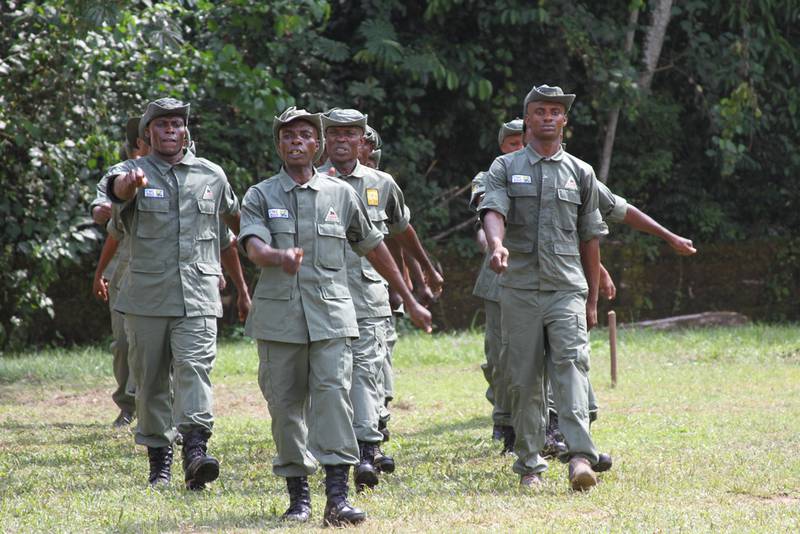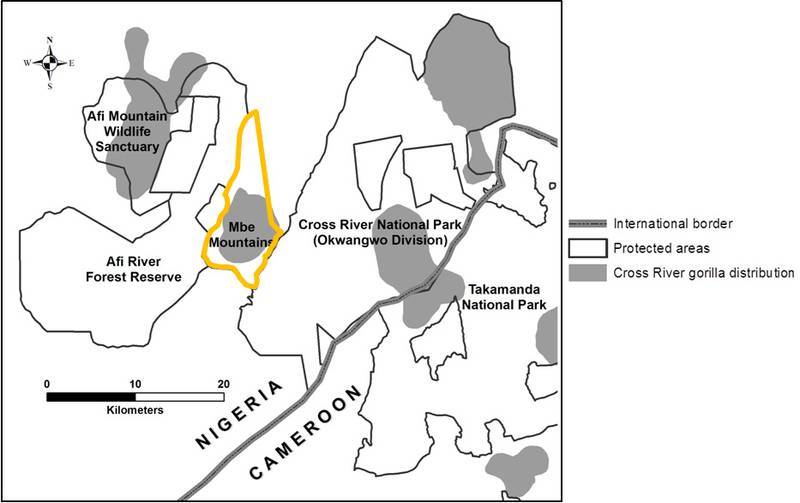Using Technology in the Mbe Mountains
Categories: Journal no. 48, Threats, Nigeria, Mbe, Cross River Gorilla, Gorilla Journal
The <link 244 _blank internal-link "MBe Mountains">Mbe Mountains</link> form part of an important habitat corridor linking Afi Mountain Wildlife Sanctuary to the Okwangwo Division of <link 240 - internal-link "Cross River National Park">Cross River National Park</link> and other Cross River gorilla sites to the east. The Mbe Forest is managed by a community conservation association, the Conservation Association of the Mbe Mountains (CAMM) with support from the <link www.wcs.org _blank external-link-new-window wcs.org>Wildlife Conservation Society (WCS)</link>. A team of 13 eco-guards managed by WCS and CAMM carry out anti-poaching and gorilla monitoring patrols in the Mbe Forest.
Though there is a high sense of ownership and commitment among the communities to protect the Mbe forest there is low technical capacity within CAMM to do so. Continued support from WCS has facilitated the management of the Mbe Mountains by CAMM. With technical assistance from the North Carolina Zoo and with funding support from the Great Ape Conservation Fund of the United States Fish and Wildlife Service, WCS introduced CyberTracker-based law enforcement and monitoring system in the Mbe Mountains in 2009. The system uses the CyberTracker software run on ruggedized handheld computers with GPS capabilities for field data collection.
Data collected with this system can be downloaded directly to computers and quickly analyzed allowing timely production of feedback for patrol planning and implementation. Introduction of the CyberTracker-based system has allowed more systematic data collection, improved the quality of data collected by eco-guards, better performance monitoring, and increased their motivation. Since the introduction of the CyberTracker-based system there has been steady improvement in monitoring and law enforcement effectiveness at this site and others.
Patrol effort has increased since the launch of the CyberTracker project from 343 patrol days/year in 2009 (by two patrol teams) to 830 patrol days/year in 2013 (by three patrol teams). There has also been an overall decrease in hunting pressure and a steady increase in great ape observations reflecting the increased patrol effort.
Levels of hunting in the Mbe Mountains are relatively low compared to adjacent protected areas such as Afi Mountain Wildlife Sanctuary and Cross River National Park. Levels of wildlife abundance are also relatively higher in the Mbe Mountains, and there have been no reports of hunting of gorillas or chimpanzees in Mbe in nearly 30 years. It is believed that this has been achieved through strong community support for conservation which has facilitated law enforcement. Against many challenges, the communities of Mbe continued to pursue, and achieved in 2013, the legal registration of CAMM to facilitate the management of the Mbe Mountains. With increasing conservation efforts, there is potential for the Mbe Mountains to become a model of successful community-based conservation, complementing efforts of government and NGOs. However, for long-term conservation of the Mbe Mountains a number of actions are essential:
official gazettement of the Mbe Mountains as a community wildlife sanctuary to afford the area greater protection,
building the capacity of CAMM and seeking sustainable long-term funding for conservation activities,
completion of the process of developing a management plan for Mbe Mountains,
creating increased conservation awareness and support for alternative livelihoods for local communities,
development of tourism in the Mbe Mountains,
review of current boundaries to include a wider corridor to the Okwangwo Division of Cross National Park and permanent demarcation of the boundary.
Inaoyom Imong, Jonathan Eban and Celestine Mengnjo
WCS is grateful to the 9 landlord communities surrounding the Mbe Mountains as well as the Cross River State Forestry Commission, the legal custodian of all forests and wildlife in Cross River State, for their support and cooperation. Thanks to Rich Bergl of the <link www.nczoo.org _blank external-link-new-window NCzoo>North Carolina Zoo</link> who introduced CyberTracker in Nigeria in 2009. We are immeasurably grateful to the Great Ape Conservation Fund of the United States Fish and Wildlife Service and acknowledge the importance of the cooperative agreement signed between the <link www.fws.gov _blank external-link-new-window fws.gov>USFWS</link> and WCS for the conservation of Cross River gorillas in 2010. We are also grateful to all other donors who support our work in the Mbe Mountains including the Ape Conservation Fund of the <link www.eaza.net/Pages/European%20Association%20of%20Zoos%20and%20Aquaria.aspx _blank external-link-new-window EAZA>European Association of Zoos and Aquaria (EAZA)</link>, <link www.cms.int _blank external-link-new-window cms.int>UNEP Convention on Migratory Species</link>, the <link www.sospecies.org _blank external-link-new-window sospecies>Save our Species Fund (IUCN)</link>, <link www.nczoo.org _blank external-link-new-window NCzoo>North Carolina Zoo</link>, <link www.clevelandmetroparks.com/Main/Home.aspx _blank external-link-new-window "Cleveland Metroparks">Cleveland MetroParks Zoo</link>, Kolmården Fundraising Foundation and <link en/home/ _blank external-link-new-window berggorilla>Berggorilla & Regenwald Direkthilfe</link>.


